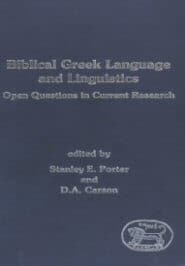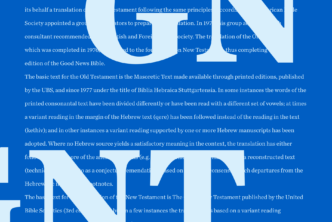I was somewhat surprised, after I posted about Jesus’ use of the diminutive κυνάριον in his delightful conversation with the Syrophoenician woman (Matt 15:26–27), to have several people make comments like this one:
Was the historical Jesus really speaking Greek with the woman? If not, then many things change about your study and conclusions.
The other language many people think Jesus might have been speaking is Aramaic, a language related to but distinct from Hebrew (and even more distinct from Greek). I answered the commenter this way:
The Aramaic question is totally fair, but it’s one I find never has any firm answer and never gets me anywhere exegetically. When it does get me somewhere (as with some interpretations of “Thou art Peter and upon this rock…”), I tend to think of it as cheating, special pleading. I agree with [the other commenter] that the final form of the (Greek) text is what I have to deal with.
I admit I’m suspicious of the whole question. What effect can it have other than to destabilize the Greek text we in fact have? When will we ever be able to uncover an Aramaic Vorlage (source text) with any certainty—much less one that actually helps us understand the words of Jesus in the New Testament? I’m already too good at evading what Jesus told me to do (“Love your enemies,” “Give to him that asks of you”). I don’t need a temptation to doubt that the New Testament faithfully records Jesus’ words.
But it’s not right for me to simply wish for Jesus to speak Greek because that would make me feel safer from challenge. So I did some study in my journals in Logos—this is precisely the kind of question that is too complicated for commentaries to handle and too narrow for monographs. So to journals I turned. And I was happy to see one of the premier New Testament scholars of the day directly taking up my question: Stanley Porter, in “Did Jesus Ever Teach In Greek?” (Tyndale Bulletin 44, no. 1 [1993]: 199–235).
I’m not going to do original research for this post; Porter’s command of the primary sources far exceeds my own. But I’m going to list in detail the major reasons why Porter’s answer to his own titular question was “Yes.” Jesus did most likely, at least on occasion, teach in Greek.
Porter says that “evidence is increasing that [lower Galilee] was the Palestinian area most heavily influenced by Greek language and culture.” Porter cites several books, as well as this interesting article by eminent Roman Catholic Joseph Fitzmyer (who writes, “There are some indications that Palestinian Jews in some areas may have used nothing else but Greek”), but Porter also points to evidence within the text of Scripture. We’ll start there.
Biblical Evidence
- “One indication of the pervasive influence of Greek [is that] in Acts 6:1 (cf. 9:29) a distinction is made between Ἐλληνισταί and Ἑβραῖοι, probably a linguistic distinction made between Jews who spoke mainly Greek and those who spoke mainly Aramaic or who also spoke Aramaic. Before the third century A.D. these terms were virtually exclusively linguistic terms referring to language competence. To distinguish those outside Palestine as Greek speakers would not have been necessary (it would have been assumed), but apparently there was a significant part of the population that spoke mostly Greek even of those resident in Jerusalem.”
- “The seven men appointed in Acts 6:5 to serve the Greek-speaking constituency all have Greek names.”
- “Referred to as the ‘Galilee of the Gentiles’ in Matthew 4:15, lower Galilee was a center for trade among the Mediterranean, Sea of Galilee and Decapolis regions. Galilee was completely surrounded by hellenistic culture.”
- “Matthew (Mt. 9:9; Lk. 5:27-28) or Levi (Mk. 2:13-14), the tax collector in Capernaum, would probably have known Greek in order to conduct his duties with the local taxpayers and the tetrarch Herod Antipas’s officials. Many of Jesus’ disciples were fishermen who worked the Sea of Galilee, including Simon Peter, Andrew, James and John. They almost assuredly would have needed to conduct in Greek much of their business of selling fish.”
Extrabiblical Evidence
Porter also points to evidence from outside the Bible.
More impressive than what is known even of Galilee for establishing the probability that Jesus spoke Greek is the epigraphic and literary evidence for the widespread knowledge of Greek throughout Palestine including Galilee…. That Greek was used not only in the Diaspora but also in Palestine, even for composition by Jews of distinctly Jewish literature including much religious literature, indicates that Greek was an important and widely used language by a sizable portion of the Palestinian Jewish population.
Literary Evidence
Porter gives several examples of literary evidence for the use of Greek:
- “There have been a number of papyrus texts (including a number of fragments) found in Palestine written in Greek by Jews. The papyri of the Judaean Desert include a wide range and variety of artifacts, such as commercial transactions, fiduciary notes, contracts of marriage, and fragments of philosophical and literary texts, among others.”
- “So far as Jewish literature is concerned, there is also significant evidence of composition being done in Greek in Palestine by Jews for Jewish audiences. For example, the book of Daniel, besides using Greek names to refer in 3:5 to three musical instruments (lyre, harp and pipes [NIV]), and being composed in Hebrew and Aramaic, in its deuterocanonical form includes additional sections composed in Greek (Prayer of Azariah and the Song of the Three Children, Susanna, and Bel and the Dragon).”
- “Worth noting as well is the fact that, although 2 Esdras and Judith were written in Hebrew, they survive virtually entirely or at least in significant part in Greek versions, quite possibly reflecting Jewish linguistic priorities for preservation of religious texts.”
Inscriptional Evidence
Porter also gives examples from inscriptions.
The inscriptional evidence points in the same direction…. There are a number of crucial texts that do point to the early and sustained, widespread use of Greek in Palestine and in particular in Galilee.
For example:
- “Kee notes that ‘when the synagogue movement began to flourish and to take on architectural forms in the second century C.E., the inscriptions were in Greek, even in Jerusalem.’”
- “The best indicator of the language of the common people is the sepulchral inscriptions, and the evidence certainly indicates a widespread and constant use of Greek in Palestine, including especially Galilee. To put the evidence from funerary inscriptions into its proper context, it is worth noting that, according to the latest statistics on published inscriptions, 68% of all of the ancient Jewish inscriptions from the Mediterranean world are in Greek (70% if one counts as Greek bilingual inscriptions with Greek as one of the languages).”
Porter concludes from the above:
In the light of this accumulated evidence, which is overwhelming when compared to the equivalent Aramaic evidence, it is surprising that many scholars have not given more consideration to the hypothesis that Jesus spoke and even possibly taught in Greek.
So what about Jesus’ own speech as recorded in the New Testament? Does it point in the same direction?
Evidence from the Recorded Speech of Jesus
Porter thinks so. He offers this evidence from within Jesus’ own words in the New Testament:
- “The first and most important example, and the one that sets the tenor for the subsequent treatment of passages, is Jesus’ trial before Pilate (Mk. 15:2-5; Mt. 27:11-14; Lk. 23:2-5; Jn. 18:29- 38; cf. 1 Tim. 6:13). It is highly unlikely that Pilate, the prefect assigned to this remote posting in the Roman empire, would have known any Semitic language. No translator or interpreter is mentioned for the conversation that occurs between Jesus and Pilate, making it unlikely that Latin or Aramaic was used. In fact, the pace of the narrative, in which conversation is held between not only Pilate and Jesus but Pilate and the Jewish leaders, Pilate and the crowd, and the Jewish leaders and the crowd, argues against an interpreter intervening. It is most likely, therefore, that Jesus spoke to Pilate in Greek.”
And that brings us back to the diminutive κυνάριον and Jesus’ conversation with the Syrophoenician woman. Porter actually cites this very passage as a reason to believe that Jesus spoke Greek:
- “The first example of a passage in which Jesus may well have spoken Greek is Mark 7:25-30, when Jesus travels to the area of Tyre. A woman with a daughter possessed by an evil spirit hears of his presence there and begs for Jesus’ help. The woman is called in Mark’s Gospel a Ἑλληνίς, a Συροφοινίκισσα by birth, i.e. a gentile (7:26). Even though the indigenous language of the area was Semitic, this area had long been under hellenistic influence (and antagonistic to the Jews; see Josephus, Ag. Ap. 1.69-72) and evidenced widespread use of Greek, as has been noted above. The description of the woman in the Gospel makes sure that the reader knows that the woman was a Greek-speaker despite her birth. Otherwise the reference is gratuitous. There is no indication of an interpreter being present.”
Did Jesus speak Greek? The New Testament doesn’t directly answer all the questions we like to ask it. But when combined with archaeological evidence, Porter concludes that
the evidence regarding what is known about the use of Greek in ancient Palestine, including the cosmopolitan hellenistic character of lower Galilee, the epigraphic and literary evidence, including coins, papyri, literary writers, inscriptions and funerary texts, but most of all several significant contexts in the Gospels, all points in one direction: whereas it is not always known how much and on which occasions Jesus spoke Greek, it is virtually certain that he used Greek at various times in his itinerant ministry.
***





